Oppidum Aduatucorum (57 BCE)
Q46861274Siege of the Oppidum of the Aduatuci (57 BCE): mopping-up operation after Caesar's Nervian victory.
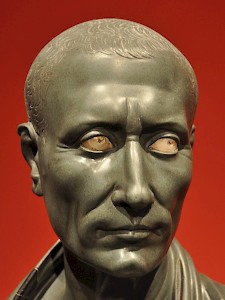
After Julius Caesar had defeated the Nervians at the Sabis (in French Flanders), he moved to the east, using an ancient road. His aim was to punish the Atuatuci, who had assisted the Nervians. He cornered them in a hillfort (oppidum) immediately south of modern Thuin. Caesar describes the events in section 29-31 of book 2 of his Commentaries on the war in Gaul. In an earlier chapter, Caesar writes that there were 19,000 Aduatucan warriors; they were attacked by seven Roman legions, or 30,000 men.
The translation is by W. A. McDevitte and W. S. Bohn.
The Siege of the Oppidum of the Aduatuci
When the Aduatuci [...] were coming up with all their forces to the assistance of the Nervians, upon this battle being reported to them, they returned home after they were on the march; deserting all their towns and forts, they conveyed together all their possessions into one town, eminently fortified by nature. While this town had on all sides around it very high rocks and precipices, there was left on one side a gently ascending approach, of not more than 200 feet in width; which place they had fortified with a very lofty double wall: besides, they had placed stones of great weight and sharpened stakes upon the walls.
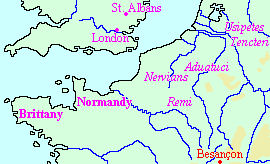
They were descended from the Cimbri and Teutones,note who, when they were marching into our province and Italy, having deposited on this side the river Rhine such of their baggage-trains as they could not drive or convey with them, left 6,000 of their men as a guard and defense for them. These having, after the destruction of their countrymen, been harassed for many years by their neighbors, while one time they waged war offensively, and at another resisted it when waged against them, concluded a peace with the consent of all, and chose this place as their settlement.
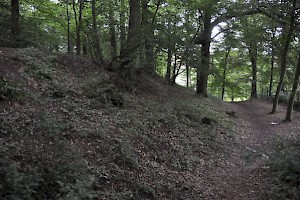
And on the first arrival of our army they made frequent sallies from the town, and contended with our men in trifling skirmishes; afterward, when hemmed in by a rampart of eighteen kilometers in circuit, they kept themselves within the town. When, vineae having been brought up and a mound raised, they observed that a tower also was being built at a distance, they at first began to mock the Romans from their wall, and to taunt them with the following speeches. "For what purpose was so vast a machine constructed at so great a distance? With what hands, or with what strength did they, especially as they were men of such very small stature trust to place against their walls a tower of such great weight?" (Our shortness of stature, in comparison to the great size of their bodies, is generally a subject of much contempt to the men of Gaul.)
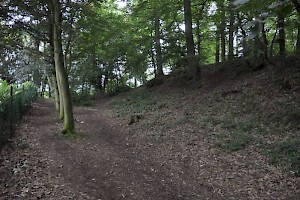
But when they saw that it was being moved, and was approaching their walls, startled by the new and unaccustomed sight, they sent ambassadors to Caesar to treat about peace; who spoke in the following manner: "That they did not believe the Romans waged war without divine aid, since they were able to move forward machines of such a height with so great speed, and thus fight from close quarters; that they resigned themselves and all their possessions to Caesar"s disposal: that they begged and earnestly entreated one thing, viz., that if perchance, agreeable to his clemency and humanity, which they had heard of from others, he should resolve that the Aduatuci were to be spared, he would not deprive them of their arms; that all their neighbors were enemies to them and envied their courage, from whom they could not defend themselves if their arms were delivered up: that it was better for them, if they should be reduced to that state, to suffer any fate from the Roman people, than to be tortured to death by those among whom they had been accustomed to rule."
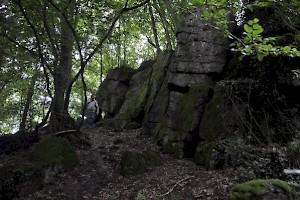
To these things Caesar replied, "That he, in accordance with his custom, rather than owing to their desert, should spare the state, if they should surrender themselves before the battering-ram should touch the wall; but that there was no condition of surrender, except upon their arms being delivered up; that he should do to them that which he had done in the case of the Nervians, and would command their neighbors not to offer any injury to those who had surrendered to the Roman people."
The matter being reported to their countrymen, they said that they would execute his commands. Having cast a very large quantity of their arms from the wall into the trench that was before the town, so that the heaps of arms almost equaled the top of the wall and the rampart, and nevertheless having retained and concealed, as we afterward discovered, about a third part in the town, the gates were opened, and they enjoyed peace for that day.
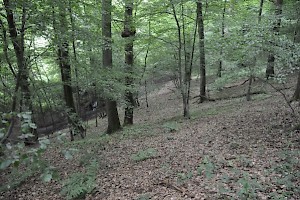
Toward evening Caesar ordered the gates to be shut, and the soldiers to go out of the town, lest the towns-people should receive any injury from them by night. The, by a design before entered into, as we afterwards understood, because they believed that, as a surrender had been made, our men would dismiss their guards, or at least would keep watch less carefully, partly with those arms which they had retained and concealed, partly with shields made of bark or interwoven wickers, which they had hastily covered over with skins, (as the shortness of time required) in the third watch,note suddenly made a sally from the town with all their forces in that direction in which the ascent to our fortifications seemed the least difficult. The signal having been immediately given by fires, as Caesar had previously commended, a rush was made thither [by the Roman soldiers] from the nearest fort; and the battle was fought by the enemy as vigorously as it ought to be fought by brave men, in the last hope of safety, in a disadvantageous place, and against those who were throwing their weapons from a rampart and from towers; since all hope of safety depended on their courage alone.
About 4,000 of the men having been slain, the rest were forced back into the town. The day after, Caesar, after breaking open the gates, which there was no one then to defend, and sending in our soldiers, sold the whole spoil of that town. The number of 53,000 persons was reported to him by those who had bought them.